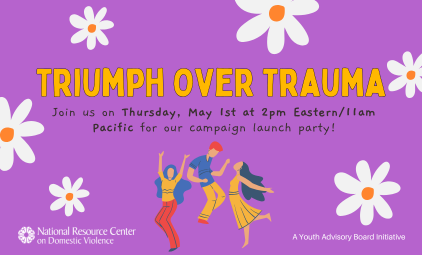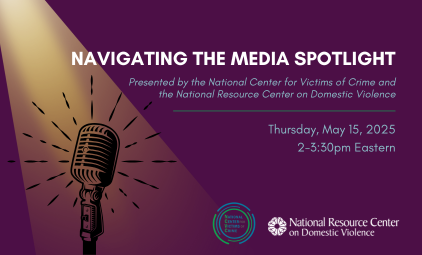Join us for an insightful webinar where we will explore how cultural values and family dynamics play a role in supporting survivors of domestic violence. Participants will gain a deeper understanding of the ways in which communities can foster safe and nurturing environments for healing.
VAWnet Event Calendar
NRCDV’s Youth Advisory Board is excited to introduce the Triumph Over Trauma Campaign in observance of Mental Health Awareness Month 2025. This youth-led campaign invites us to normalize and destigmatize experiences of trauma and adversity, and explore the ways we grow from these experiences towards resilience and healing. The launch party will center the voices of youth leaders who will share their experiences and reflections in celebration of survivorship. Join us to learn more about the #TriumphOverTrauma campaign and how you and your community can be part of it!
Social media plays a far-reaching role in shaping mental health, relationships, and public trust. The U.S.
We recognize that working in this field can feel like we’re on the never-ending path to create change that we’ll never see. It’s work that can consist of equal parts hope, optimism, frustration, and exhaustion. Through this year’s theme “Forging Ahead: Our Map to a World Without Violence,” we hope to bring opportunities for the advocacy community to connect, share information, and engage in efforts needed to address and prevent intimate partner violence, family violence, sexual violence, dating violence, and/or stalking.
Indiana Youth Institute’s 2025 National Summit on Youth Well-Being tackles the big challenges facing today’s youth. We’re zeroing in on the kids who often get overlooked—those from low-income families, communities of color, immigrant backgrounds, and kids who’ve been through challenges like trauma or neglect. This conference brings together expert speakers from across the country to share their knowledge and give you real-world strategies to make a difference.
Join the New York State Coalition Against Domestic Violence, Survivors Justice Project, the Women & Justice Project, and Kashif Incubator for an exclusive screening of Beyond Survival, a powerful hour-long documentary that brings to life the fight for justice. This inspiring film tells the story of the Domestic Violence Survivors Justice Act (DVSJA)—a landmark sentencing reform—and honors the resilience of currently and formerly incarcerated survivors, the advocates who championed their cause, and the elected leaders who fought to pass this groundbreaking legislation.














